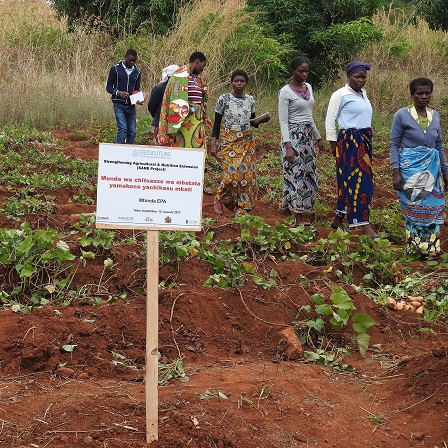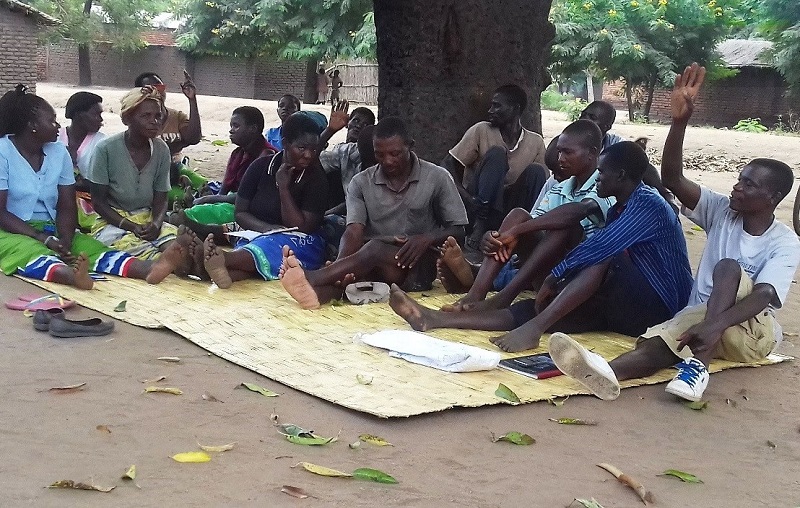Strengthening Agricultural and Nutrition Extension in Malawi
SANE strengthens the capacity of the Government of Malawi's Department of Agricultural Extension Services (DAES) to mobilize and work with service providers to deliver agricultural and nutrition extension and advisory services more effectively and in a coordinated manner in the Feed the Future Zone of Influence.
Project Updates
JULY 2017 - Motivation to Strengthen Services after Study Results Presented
 Access to quality and efficient extension services is a fundamental element in smallholder farming success. Understanding who is benefitting from, and has access to, public extension advice and technologies is one step that SANE took towards strengthening services for men and women smallholders in rural Malawi. SANE recently shared the results from a 2015 baseline household survey, conducted in ten districts, which indicated some key areas of extension improvement. Dr. Lonester Sibande presented results to stakeholders DAECC and ASP in four districts: Chikwawa, Nsanje, Balaka and Dedza. The results show that female-headed households (aged under 35 years) have less access to extension advice on adopting improved technologies than male-headed households in the same age bracket. Similarly, more male-headed households use ICT methods to access extension advice. However, only 10% of the households had demanded the extension advice they received. This suggests that farmers do not know what to demand, or do not know the options available, that they can demand at all, or simply do not believe that the extension system can help them. Despite the low adoption rate of improved technologies, the presentations demonstrated that ICT-based extension services are most effective when combined with face-to-face extension.
Access to quality and efficient extension services is a fundamental element in smallholder farming success. Understanding who is benefitting from, and has access to, public extension advice and technologies is one step that SANE took towards strengthening services for men and women smallholders in rural Malawi. SANE recently shared the results from a 2015 baseline household survey, conducted in ten districts, which indicated some key areas of extension improvement. Dr. Lonester Sibande presented results to stakeholders DAECC and ASP in four districts: Chikwawa, Nsanje, Balaka and Dedza. The results show that female-headed households (aged under 35 years) have less access to extension advice on adopting improved technologies than male-headed households in the same age bracket. Similarly, more male-headed households use ICT methods to access extension advice. However, only 10% of the households had demanded the extension advice they received. This suggests that farmers do not know what to demand, or do not know the options available, that they can demand at all, or simply do not believe that the extension system can help them. Despite the low adoption rate of improved technologies, the presentations demonstrated that ICT-based extension services are most effective when combined with face-to-face extension.
This was the first time the Ministry of Agriculture, Irrigation and Water Development allowed key stakeholders in agricultural and nutrition extension within the districts to obtain feedback on the results of both assessments. Participants were able to engage in group work (photo right) to respond to questions on the status of extension provision, as well as the functionality of DAESS platforms (i.e. How effective were the platforms in enabling equitable access to extension advice and did they function well?) Groups then discussed what can be done to address the identified gaps. Stakeholders were pleased to discover communication and service provision gaps they could tackle to increase the functionality of the DAESS platforms in each district to ably serve farmers.
JUNE 2017 - Orange Flesh Sweet Potatoes Varieties Improve Nutrition and Incomes
 In June, SANE collaborated with the Department of Agriculture Research Services - Horticulture Commodity Unit and the Feed the Future Agricultural Diversification Project (Ag-Div) in Ntonda EPA at Chilunduka and Jiya village to implement a series of field days aimed at strengthening interaction and linkages between researchers, extension services and farmers. The activity was organized to create and enhance awareness about availability, innovations and value addition to orange flesh sweet potatoes. The field days revolved around on-farm demonstration on a variety of Orange Fleshed Sweet Potatoes. The farmer field days also consisted of cooking demonstrations which were led by Mrs. Charity Kambani, of Ag-Div, which enabled both male and female farmers to learn various ways of cooking sweet potato dishes.
In June, SANE collaborated with the Department of Agriculture Research Services - Horticulture Commodity Unit and the Feed the Future Agricultural Diversification Project (Ag-Div) in Ntonda EPA at Chilunduka and Jiya village to implement a series of field days aimed at strengthening interaction and linkages between researchers, extension services and farmers. The activity was organized to create and enhance awareness about availability, innovations and value addition to orange flesh sweet potatoes. The field days revolved around on-farm demonstration on a variety of Orange Fleshed Sweet Potatoes. The farmer field days also consisted of cooking demonstrations which were led by Mrs. Charity Kambani, of Ag-Div, which enabled both male and female farmers to learn various ways of cooking sweet potato dishes.
JUNE 2017 - Development of informational materials to support sensitization of the DAESS
 As a means of improving the understanding and implementation of the District Agricultural Extension Services System (DAESS), the Strengthening Agricultural and Nutrition Extension (SANE) Project has worked with districts to improve the DAESS guidelines and develop Standard Operating Procedures (SOPs) for establishing and managing the DAESS platforms. Updated DAESS guidelines and district-led SOPS were developed in December, 2016 through collaborative workshops led by SANE. In January 2017, districts expressed a need for informational materials to use in the sensitization and training of all stakeholders about the DAESS and SOPS. In response, this June the SANE Project, in collaboration with the Feed the Future Agriculture Diversification (Ag-Div) Activity, held a workshop aimed at developing informational materials about the DAESS guidelines and the SOPS, as a means to help build the district capacity’s in the harmonization of messages . The main objective of the workshop was to develop content in both English and Chichewa that clarified the generic DAESS guidelines and SOPs to assist districts in communicating to farmers, extension service providers, and other stakeholders. During the week-long workshop, SANE worked with stakeholders from the DAESS, districts, and extension workers to discuss the DAESS guidelines and SOPs and develop new informational materials. Participants produced posters, a booklet, a jingle, and handouts, which were translated into Chichewa in order to also communicate DAESS platforms to stakeholders who aren’t fluent in English. As a result of the week-long training provided by SANE and Ag-Div, the districts were able to create new informational materials which will be reviewed then distributed to all stakeholders as a means to assist in the sensitization and training of all stakeholders about the DAESS and SOPs. (Photo left: Acting COP Clodina Chowa engages in discussion).
As a means of improving the understanding and implementation of the District Agricultural Extension Services System (DAESS), the Strengthening Agricultural and Nutrition Extension (SANE) Project has worked with districts to improve the DAESS guidelines and develop Standard Operating Procedures (SOPs) for establishing and managing the DAESS platforms. Updated DAESS guidelines and district-led SOPS were developed in December, 2016 through collaborative workshops led by SANE. In January 2017, districts expressed a need for informational materials to use in the sensitization and training of all stakeholders about the DAESS and SOPS. In response, this June the SANE Project, in collaboration with the Feed the Future Agriculture Diversification (Ag-Div) Activity, held a workshop aimed at developing informational materials about the DAESS guidelines and the SOPS, as a means to help build the district capacity’s in the harmonization of messages . The main objective of the workshop was to develop content in both English and Chichewa that clarified the generic DAESS guidelines and SOPs to assist districts in communicating to farmers, extension service providers, and other stakeholders. During the week-long workshop, SANE worked with stakeholders from the DAESS, districts, and extension workers to discuss the DAESS guidelines and SOPs and develop new informational materials. Participants produced posters, a booklet, a jingle, and handouts, which were translated into Chichewa in order to also communicate DAESS platforms to stakeholders who aren’t fluent in English. As a result of the week-long training provided by SANE and Ag-Div, the districts were able to create new informational materials which will be reviewed then distributed to all stakeholders as a means to assist in the sensitization and training of all stakeholders about the DAESS and SOPs. (Photo left: Acting COP Clodina Chowa engages in discussion).
MAY 2017 - Farmer Learning Centers in Chikwawa
 In partnership with United in Building and Advancing Life Expectations (UBALE) project, SANE visited six Farmer Learning Centers (FLCs) in Chikwanwa district this May. SANE and UBALE are promoting FLCs and other extension innovations through a study which aims at enhancing knowledge and skills within the district to increase productivity and improve agricultural technology adoption and adaptation. In order to assess the implementation progress of the FLCs, SANE’s Monitoring, Evaluation and Learning Officer and Professor Paul Mapfumo of the University of Zimbabwe conducted field visits to FLCs in an effort to provide technical support to the implementing partners. They wanted to listen, learn, and understand how farmers within the district are implementing FLCs and adopting research for their agricultural practices.
In partnership with United in Building and Advancing Life Expectations (UBALE) project, SANE visited six Farmer Learning Centers (FLCs) in Chikwanwa district this May. SANE and UBALE are promoting FLCs and other extension innovations through a study which aims at enhancing knowledge and skills within the district to increase productivity and improve agricultural technology adoption and adaptation. In order to assess the implementation progress of the FLCs, SANE’s Monitoring, Evaluation and Learning Officer and Professor Paul Mapfumo of the University of Zimbabwe conducted field visits to FLCs in an effort to provide technical support to the implementing partners. They wanted to listen, learn, and understand how farmers within the district are implementing FLCs and adopting research for their agricultural practices.
The Mpangowalimba Farmer Learning Centre (photo right) has largely been successful. During the rainy cropping season, their main objective was to research the performance of the various maize varieties to identify the varieties suitable to their location and most beneficial to farmers. During SANE’s observation of this FLC, it was evident that they had adopted the group work method promoted by SANE, which the FLC found helpful for reducing work required to implement the research activities. Farmers within this FLC also preferred the group work approach as it motivated them to try new agricultural practices.
The Mpangowalimba farmers are very organized in their research activities and it was apparent that all members present for this visit had followed their research activity plans. Because they implemented the maize research, this FLC demonstrated ordered research plots, clear plans, and focus areas for other crops, like rice, for the upcoming year.
Through the assistance of SANE farmers are now able to demand services beyond the farm research trials such as on nutrition and irrigation. Extension worker are keen to understand the farmers demands and link them with service providers or other extension workers who have the capacity to provide the requested advice.

![]()




